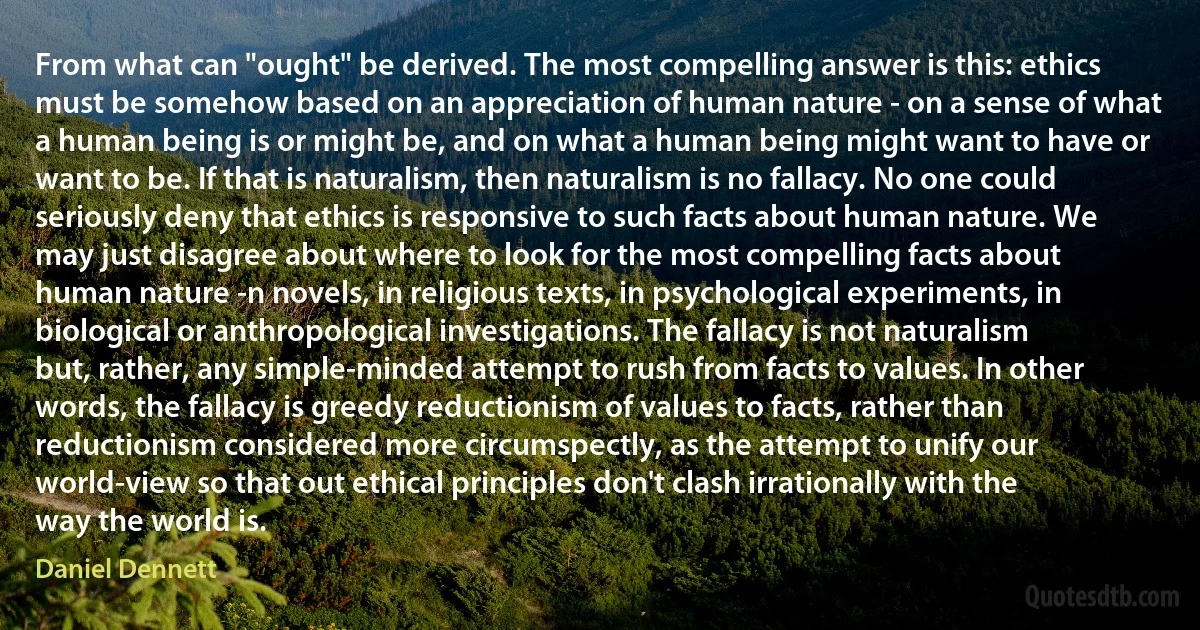
From what can "ought" be derived. The most compelling answer is this: ethics must be somehow based on an appreciation of human nature - on a sense of what a human being is or might be, and on what a human being might want to have or want to be. If that is naturalism, then naturalism is no fallacy. No one could seriously deny that ethics is responsive to such facts about human nature. We may just disagree about where to look for the most compelling facts about human nature -n novels, in religious texts, in psychological experiments, in biological or anthropological investigations. The fallacy is not naturalism but, rather, any simple-minded attempt to rush from facts to values. In other words, the fallacy is greedy reductionism of values to facts, rather than reductionism considered more circumspectly, as the attempt to unify our world-view so that out ethical principles don't clash irrationally with the way the world is.
Daniel DennettRelated topics
answer attempt biological compelling ethical ethics fallacy human might naturalism nature ought rush sense way world words reductionism facts world-viewRelated quotes
When I behold the scientific and so-called philosophers full of selfish feelings, and of a tenency to war against circumstances and Providence, I say to myself: They are not true priests, they are but half prophets - it not absolutely false ones. They have read the great page simply with the physical eye, and with none of the spirit within. The intellectual, the moral, the religious seem to me all naturally bound up and interlinked together in one great and harmonious whole... That God is one, and that all the works and the feelings He has called into existence are ONE; this is a truth (a biblical and scriptural truth too) not in my opinion developed to the apprehension of most people in its really deep and unfanthomable meaning. There is too much tendency to making separate and independent bundles of both the physical and the moral facts of the universe. Whereas, all and everything is naturally related and interconnected. A volume could I write you on this subject.

Ada Lovelace
Each of our moral, mental, and bodily powers must have its development based upon its own nature, and not based upon artificial and outside influences. Faith must be developed by exercises in believing and cannot be developed from the knowledge and understanding, only, of what is to be believed; thought must grow from thinking, for it cannot come simply from the knowledge and understanding of what is to be thought, or the laws of thought; love must be developed by loving, for it does not arise merely from a knowledge and understanding of what love is and of what ought to be loved; art, also, can only be cultivated through doing artistic work and acquiring skill, for unending discussion of art and skill will not develop them. Such a return to the true method of Nature in the method of the development of our powers necessitates the subordination of education to the knowledge of the various laws which govern those powers.

Johann Heinrich Pestalozzi
Islam, more than any other religion human beings have devised, has all the makings of a thoroughgoing cult of death..... As a matter of doctrine, the Muslim conception of tolerance is one in which non-Muslims have been politically and economically subdued, converted, or put to sword..... Yes, the Bible contains its own sadistic lunacy-but the above [Qur'an] quotations [taken from The End of Faith, pp. 117-123] can be fairly said to convey the central message of the Qur'an-and of Islam at nearly every moment in its history. The Qur'an does not contain anything like a Sermon on the Mount. Nor is it a vast and self-contradictory book like the Old Testament, in which whole sections (like Leviticus and Deuteronomy) can be easily ignored and forgotten. The result is a unified message of triumphalism, otherworldliness, and religious hatred that has become a problem for the entire world. And the world still waits for moderate Muslims to speak honestly about it.

Sam Harris
Much of what we do as adults is based on this imitative absorption during our childhood years. Frequently we imagine that we are behaving in a particular way because such behaviour accords with some abstract, lofty code of moral principles, when in reality all we are doing is obeying a deeply ingrained and long 'forgotten' set of purely imitative impressions (along with out carefully concealed instinctive urges) that makes it so hard for societies to change their customs and their 'beliefs'. Even when faced with exciting, brilliantly rational new ideas, based on the application of pure, objective intelligence, the community will still cling to its old home-based habits and prejudices. This is the cross we have to bear if we are going to sail through our vital juvenile 'blotting-paper' phase of rapidly mopping up the accumulated experiences of previous generations. We are forced to take the biased opinions along with the valuable facts.

Desmond Morris
It may be observed of mathematicians that they only meddle with such things as are certain, passing by those that are doubtful and unknown. They profess not to know all things, neither do they affect to speak of all things. What they know to be true, and can make good by invincible arguments, that they publish and insert among their theorems. Of other things they are silent and pass no judgment at all, choosing rather to acknowledge their ignorance, than affirm anything rashly. They affirm nothing among their arguments or assertions which is not most manifestly known and examined with utmost rigour, rejecting all probable conjectures and little witticisms. They submit nothing to authority, indulge no affection, detest subterfuges of words, and declare their sentiments, as in a court of justice, without passion, without apology; knowing that their reasons, as Seneca testifies of them, are not brought to persuade, but to compel.

Isaac Barrow
